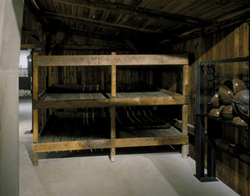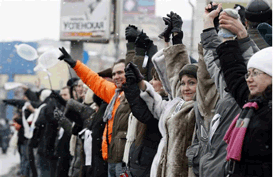News from Poland, Russia and Colombia
Tuesday's World Events — Posted on February 28, 2012
POLAND – Poland, U.S. tussle over Auschwitz barrack on loan

A barrack that once housed doomed prisoners at the Nazis' Auschwitz death camp on display at the United States Holocaust Memorial Museum.
WARSAW | Polish and American officials are engaged in intense talks to determine the fate of a sensitive object: a barrack that once housed doomed prisoners at the Nazis’ Auschwitz death camp that is now on display at the U.S. Holocaust Memorial Museum.
Poland is demanding the return of the barrack, which has been on loan to the Washington museum for more than 20 years and is an important part of its permanent exhibition.
But the American museum is resisting the demand, saying the valuable object shouldn’t be moved partly because it is too fragile.
“Due to the barrack’s size and the complexity of its installation, removing and transporting it to Poland presents special difficulties, including potentially damaging the artifact,” the Holocaust museum said in a statement to the Associated Press.
“Both the Museum and our Polish partners have been actively discussing various proposals, and we remain committed to continue working with them to resolve this matter.” …
The director of the Auschwitz-Birkenau museum, Piotr Cywinski, accuses the U.S. institution of violating the terms of a 20-year loan on the barrack, saying the loan expired in 2009.
“We have indicated many times that this half of the barrack must return, that there is no other solution in accordance with the law,” Mr. Cywinski said.
“It’s a very important object, not just for Washington but for the integrity of Birkenau, the last authentic site of Holocaust remembrance among all the major death camps.”
The U.S. Holocaust museum confirms that the 20-year loan on the barrack began in 1989, but says that it was a renewable loan – and notes that Polish law was changed since then.
RUSSIA – Thousands form human chain in anti-Putin protest

Thousands of people wear white ribbons as they form a 10-mile human chain around the Moscow inner ring road during an opposition protest against Russian Prime Minister Vladimir Putin for the upcoming elections in Moscow on February 26, 2012.
MOSCOW | Thousands of protesters held hands to form a 10-mile human chain encircling central Moscow on Sunday to keep up the pressure on Prime Minister Vladimir Putin as he prepares to extend his rule for six more years.
Mr. Putin, who was Russia’s president from 2000 to 2008, is running for a third, now six-year, term in a March 4 election. He is expected to win easily against four Kremlin-approved challengers, but an unprecedented wave of protests has undermined his image as a strong leader who rules with broad public support.
Sunday’s protest appeared to have drawn close to the 34,000 people that opposition activists estimated were needed to complete the chain along the Garden Ring, a wide road that makes a loop around the city center. Almost all of the people standing in the wet snow wore the white ribbons that have become a symbol of the peaceful anti-Putin protest movement. …
Participants in Sunday’s demonstration held up white signs in the shape of a car’s license plate that said, “We’ll drive out Putin.” The number on the plate was 04 03 12, the date of the election.
After the demonstration ended, about a thousand activists moved to a square near the Kremlin where festivities were under way for Maslenitsa, or Butter Week. The holiday, similar to Carnival in the West, precedes Lent in the Orthodox Christian calendar and ushers out the winter.
“We believe that Russia will not withstand six more years of political winter,” opposition leader Sergei Udaltsov said. “Everything will freeze completely. Therefore, we have to do everything we can to prevent that.”
The protest ended with the activists releasing bunches of white balloons.
COLOMBIA – Colombia’s FARC to give up kidnapping
Colombia’s main rebel group, commonly known as the FARC, announced it is freeing the last of the government captives it has held for years, and will abandon the practice of kidnapping.
The leftist Revolutionary Armed Forces of Colombia said on its website that it will free 10 “prisoners of war” and says they are the last in their control.
The government says the rebel group holds at least 12.
A liberation could help advance toward negotiations to end the long civil conflict since the government says the group known as the FARC must free all the hostages it holds before talks can start. However the FARC did not say it was abandoning hostilities. …
Latin America’s last major rebel movement, the FARC was founded in 1964. It has been releasing captives piecemeal since early 2008. The new statement assured that the group will give up the practice of kidnapping.
The FARC has waged a 47-year revolutionary war against the Colombian government and numbers about 8,000 militants, according to the country’s Defence Ministry. The group has been hit hard in recent years by Colombia’s U.S.-backed military.
(The news briefs above are from wire reports and staff reports posted at washingtontimes.com on February 26 and Feb. 26, and CBC.ca on Feb. 26.)
Questions
1. For each of the 3 countries, give the following information:
a) location/the countries that share its borders
b) the religious breakdown of the population
c) the type of government
d) the chief of state (and head of government if different) [If monarch or dictator, since what date has he/she ruled? - include name of heir apparent for monarch]
e) the population
[Find the answers at the CIA World FactBook website. For each country, answers can be found under the "Geography" "People" and "Government" headings. Go to worldatlas.com for a list of continents.]
NOTE: Before answering the questions below, read the info under "Background" and watch the videos under "Resources."
2. For POLAND:
a) list the who, what, where and when of the news item
b) Poland loaned the barrack to the U.S. Holocaust Museum in 1989 for 20 years. Polish law requires the museum to return the barrack to Poland. Should the museum comply? Explain your answer.
3. For RUSSIA:
a) list the who, what, where and when of the news item
b) Vladimir Putin was an officer in the KGB (Russian secret police) from 1975-1992. He served as president for 2 terms (from 2000-2008). Due to constitutionally mandated term limits, he was ineligible to run for a third consecutive presidential term in 2008. After the victory of his successor Dmitry Medvedev (whom he had chosen for the office) in the 2008 presidential elections, he was nominated by Medvedev to be Russia's Prime Minister. Putin is now again eligible to run for president. Protests against his candidacy began in December following a parliamentary election that saw widespread vote rigging to boost the results for Mr. Putin's party, and also because of general opposition to his once more becoming president. Why are Russians so opposed to Mr. Putin again becoming president?
4. For COLOMBIA:
a) list the who, what, where and when of the news item
b) Who considers FARC a terrorist organization?
Background
POLAND:
- The issue over the Auschwitz barrack has arisen because of a Polish law aimed at safeguarding a cultural heritage ravaged by past wars, particularly World War II.
- Under the law, passed in 2003, any historic object on loan abroad must return to Poland every five years for inspection.
- While Poland appears open to renewing the loan, it says the barrack must return - at least temporarily.
- Because of the rule, the U.S. museum in recent years has returned thousands of objects dating to the Holocaust, including suitcases, shoes and prosthetic limbs, often in exchange for new loans of similar or identical items.
- The barrack on view in Washington is, in fact, just half of a wooden building where prisoners slept in cramped, filthy and often freezing conditions as they awaited extermination (murder), often in gas chambers.
- The remaining half still stands at Birkenau, a part of the vast Auschwitz-Birkenau complex.
- The two camps, Auschwitz and Birkenau, are about two miles apart but were part of the same machinery of death during the war and the complex is typically referred to simply as Auschwitz.
ABOUT AUSCHWITZ:
- Auschwitz (1940–1945), was a network of Nazi concentration and extermination camps built and operated by the Nazis in Poland during World War II.
- It was the largest of the German concentration camps, consisting of Auschwitz I (the base camp); Auschwitz II–Birkenau [the extermination (death) camp]; Auschwitz III–Monowitz, also known as Buna–Monowitz (a labor camp); and 45 satellite camps.
- Auschwitz II–Birkenau was designated by Heinrich Himmler, head of the SS, and Germany's Minister of the Interior, as the place of the "final solution of the Jewish question in Europe."
- From early 1942 until late 1944, transport trains delivered Jews to the camp's gas chambers from all over Nazi-occupied Europe.
- The camp's first commandant, Rudolf Höss, testified after the war at the Nuremberg Trials that up to three million people had died there (2.5 million gassed, and 500,000 from disease and starvation),a figure since revised to 1.1 million, around 90 percent of them Jews.
- Others deported to Auschwitz included 150,000 Poles, 23,000 Roma and Sinti, 15,000 Soviet prisoners of war, some 400 Jehovah's Witnesses and tens of thousands of people of diverse nationalities.
- Those not killed in the gas chambers died of starvation, forced labor, infectious disease, individual executions, and medical experiments.
- On January 27, 1945, Auschwitz was liberated by Soviet troops, a day commemorated around the world as International Holocaust Remembrance Day.
- In 1947, Poland founded a museum on the site of Auschwitz I and II, which by 2010 had seen 29 million visitors—1,300,000 annually—pass through the iron gates crowned with the infamous motto, Arbeit macht frei ("work brings freedom"). (from wikipedia)
--------------------------------------------------------------------------
RUSSIA:
- Young Putin supporters also were out on sections of the Garden Ring on Sunday. Wearing heart-shaped red signs around their necks that said, "Putin loves everyone," they handed out similar ribbons in imitation of the protesters. Some passers-by refused to take the pro-Putin ribbons, which had stripes of white, blue and red like the national flag.
- The Garden Ring was the scene of protests on two previous Sundays, when hundreds of people drove cars decorated with white ribbons and balloons as others waved from the sidewalks and overpasses as they went by, horns blaring.
- These demonstrations have helped the protest movement maintain momentum between the huge rallies in Moscow that have drawn tens of thousands of people.
- The protests began in December following a parliamentary election that saw widespread vote rigging to boost the results for Mr. Putin's party. Many Russians already were steaming over Mr. Putin's announcement in September that he and President Dmitry Medvedev intended to swap jobs. The presidential election was presented as a formality.
- No longer willing to tolerate Mr. Putin's system of "managed democracy," the protesters have demanded fair elections in which opposition candidates are free to take part. Some protesters have called for Mr. Putin to step down.
----------------------------------------------------------------
COLOMBIA - FARC:
- FARC is a guerrilla organization, self-proclaimed Marxist-Leninist. The FARC is considered a terrorist group by the Colombian government, the United States, Canada, the Latin American Parliament, and the European Union. (from wikipedia.org)
- The FARC continues to wage a war of words devoted to Marxist principles, despite the fact that many of its battles are fought with the less idealistic motive of controlling the illicit drug industry. (from tkb.org)
- FARC is responsible for most of the ransom kidnappings in Colombia; the group targets wealthy landowners, foreign tourists, and prominent international and domestic officials. FARC stepped up terrorist activities against infrastructure in cities before Colombia's May 2002 presidential election. (from cfr.org)
(Read about FARC at cfr.org/publication/9272/.)
